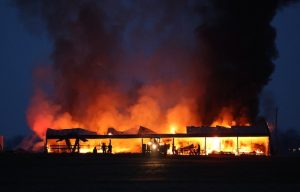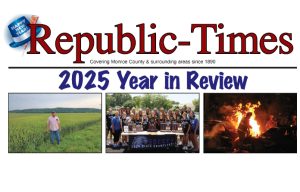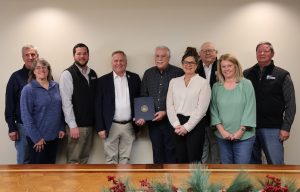Ice rescue training hopes to prevent future tragedy
Though ice on Monroe County lakes and ponds might be thicker this winter than in recent years, safety is even more important than ever.
Even when the ice might look solid and stable, drawing in curious park-goers and children, ice is never 100 percent safe.
This is the point members of Project Skipper aim to stress — especially in the heart of a cold winter such as this one and with temperatures starting to rise.
Wednesday marks the fourth anniversary of the deaths of three of this area’s own: Kathy Baxmeyer, her 7-year-old son Kadin and his 6-year-old friend Austin, who drowned in an icy lake on the Baxmeyer property in rural Waterloo on Feb. 19, 2010.
Because of that tragedy, the topic of ice safety is very near and dear to Karen Kaiser, Kathy’s sister.
Kaiser, along with other family members and friends of the deceased, have put in countless hours creating a not-for-profit organization called Project Skipper to spread the word. The group aims to teach kids and their parents about the dangers of going onto ice-covered bodies of water.
Kathy Baxmeyer and her son Kadin.Though the last few winters have been too warm for much ice to form on large water bodies for long periods of time, this year hits close to home, Kaiser said, because of how cold it’s been.
On Saturday, the Waterloo Fire Department hosted its yearly ice rescue training exercise in Lakeview Park for firefighters.
Members of the WFD had to cut holes in the 10-inch-thick ice on the lake using chainsaws in order to do their training in the 15 degree weather.
“We train every year. Our objective is to train every firefighter to properly use this equipment and techniques to rescue people,” Waterloo Fire Chief Mark Yeager said.
Kaiser came out to watch, noting that this year was way more realistic for the firefighters because of the cold and being able to practice on real ice, unlike the year before.
“This is some serious training,” she said.
The firefighters dressed in buoyant, full-body wetsuits designed specifically for ice rescue situations.
The suits keep them warm and even contain small ice picks built into the sleeves to help them pull themselves out of the body of water.
The firefighters practiced aided rescue using an inflatable boat, along with self-rescue using the ice picks. They practiced techniques Kaiser said she incorporates into Project Skipper’s educational materials, including how the group got its name.
The letter S stands for “stay calm.” The letter K stands for “kick.” The letter P stands for “pull” and the letter R stands for “roll.”
Kaiser praised the WFD for its training and for constantly spreading awareness about issues such as ice safety.
“They appreciate us and we appreciate them,” she said. “But everything they’re learning (out here), I hope they never have to use.”
She shared her concern for the weather this week, which is forecasted to be considerably warmer than past weeks. This could lead to a lot of the ice melting and more people being out in places like the park enjoying the weather.
“It might be 10 inches thick here, but who knows how thick it is over there,” Kaiser said, pointing across the lake.
From left, Bruce Kohnz, Rich Harbaugh and Pete Dehn of the WFD practice ice rescue techniques Saturday at Lakeview Park in Waterloo. (Kermit Constantine photo)This is the biggest danger of treading on ice, and it’s why the motto of Project Skipper is “See Ice, Think Twice.”
Kaiser and members of Project Skipper host ice safety training at different events such as the Monroe County Fair and have spoken to Girl Scout and Boy Scout troops.
They perform simulations using a bucket of water, so the kids can see how the water temperature would actually be over an extended period of time.
“We have them get down on their stomachs and go through the four steps, too,” she said. “We try to keep it as interactive as possible.”
The Project Skipper website, www.ProjectSkipper.com, offers educational materials for teachers, safety tips and even ice experiments and coloring pages.
“We’re all about educating, so no one has to suffer like we did,” Kaiser said, reflecting back on that sad February evening just four years ago.






